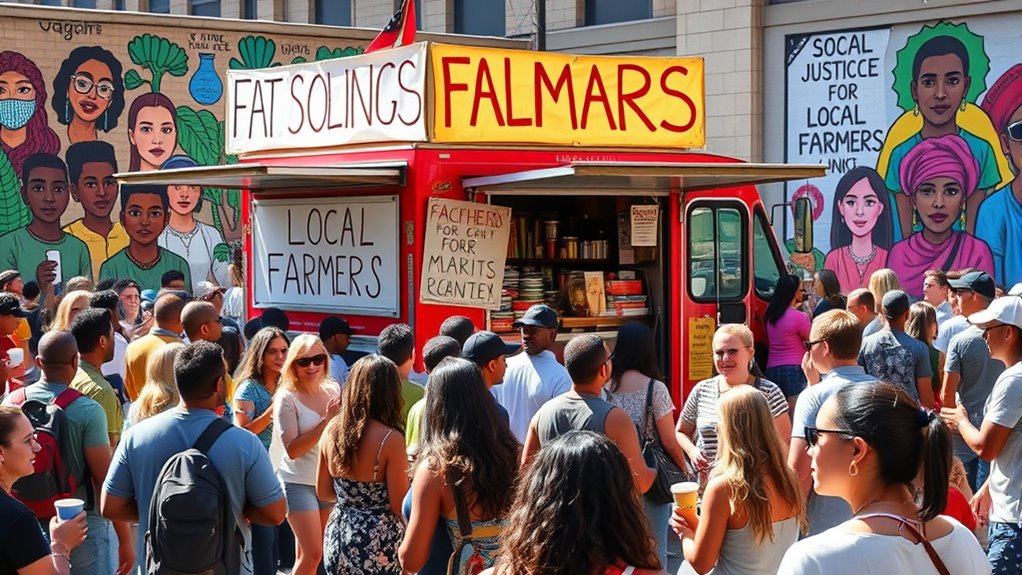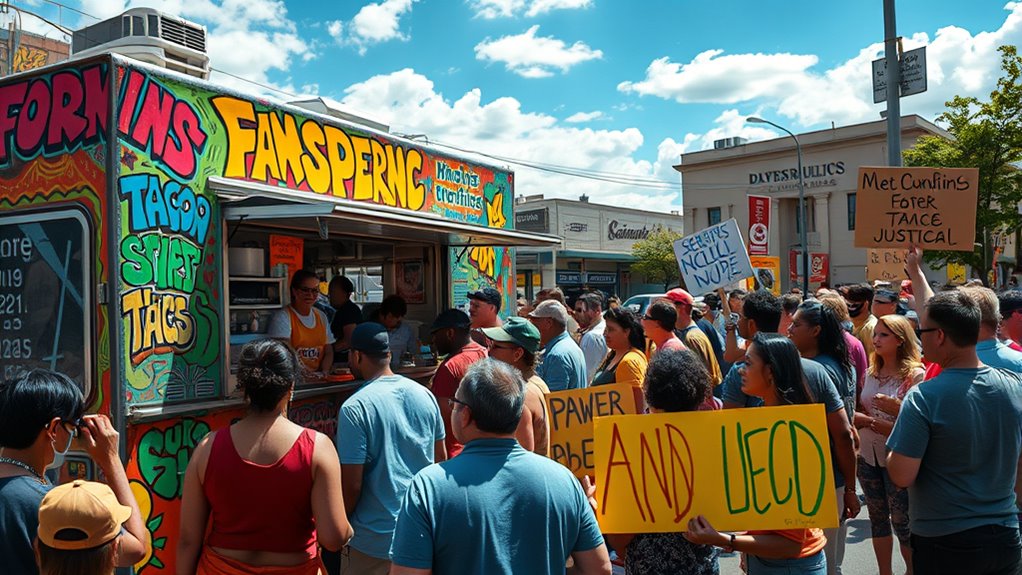Food trucks have become influential platforms for social activism, combining delicious cuisine with community engagement. They bring diverse voices, stories, and causes directly to neighborhoods, parks, and events, making activism accessible and engaging. By supporting minority-owned businesses and showcasing cultural richness, they foster inclusion and understanding. Their mobility helps reach underserved groups and spark conversations around important issues. Keep exploring to see how these mobile platforms are turning food into powerful tools for change.
Key Takeaways
- Food trucks serve as mobile platforms to raise awareness and promote social causes directly within communities.
- They facilitate community engagement through outreach events, free meals, and participatory activities.
- Food trucks celebrate cultural diversity by showcasing cuisines from various backgrounds, fostering understanding and inclusion.
- They support immigrant and minority entrepreneurs, sharing stories and promoting cultural pride through authentic food.
- Food trucks act as symbols of inclusion, empowering social activism and connecting communities around shared causes.

Food trucks have become more than just convenient eateries; they’ve evolved into powerful platforms for social activism. As you navigate city streets and bustling neighborhoods, you’ll notice these mobile kitchens serving more than just food—they’re serving messages, raising awareness, and fostering community engagement. One way they do this is through community outreach. Instead of waiting for people to come to a fixed location, food trucks actively bring messages directly to neighborhoods, parks, and community events. This mobility allows you to reach diverse groups, including those who might not otherwise engage with social issues or activism. By participating in local festivals or setting up in underserved areas, these trucks create opportunities for dialogue, education, and involvement. When you see a food truck offering free meals in exchange for signing petitions or attending workshops, it becomes clear how they’re using their platform to foster a sense of collective purpose. They’re not just selling food; they’re building bridges within communities, encouraging participation, and amplifying voices that might otherwise go unheard. Additionally, many food trucks incorporate safe food handling practices, ensuring health standards are maintained while promoting social causes. Cultural representation plays a vital role in how food trucks serve as tools for social activism. You’ll notice trucks showcasing cuisines from different parts of the world—Mexican, African, Asian, and more—highlighting the rich diversity of cultures within your city. By doing so, they’re not just offering delicious meals; they’re celebrating cultural identities and promoting understanding among diverse populations. When you stop at a truck serving authentic dishes from a particular country, you’re gaining more than a meal—you’re experiencing a piece of that culture. This form of cultural representation challenges stereotypes and fosters appreciation for different traditions. Many food trucks intentionally partner with immigrant or minority-owned businesses, giving these entrepreneurs a platform to share their heritage and stories. Through food, they’re telling narratives that might otherwise remain unheard, encouraging you to see the world through different lenses. In this way, food trucks become dynamic symbols of inclusion and cultural pride, helping to bridge gaps and foster empathy in your community. Ultimately, these mobile vendors aren’t just about satisfying hunger—they’re about making a statement. By integrating community outreach and cultural representation into their operations, food trucks empower you to participate in social activism in accessible and tangible ways. Whether it’s through engaging conversations, sharing cultural stories, or supporting local causes, you’re contributing to a movement that uses food as a catalyst for change. As you enjoy your meal, remember that each bite can be part of a larger effort to build more inclusive, aware, and connected communities.
Frequently Asked Questions
How Do Food Trucks Select Causes to Support?
You choose causes to support based on community engagement and cause alignment. You look for issues that resonate with your values and those of your customers, ensuring authentic support. You consider local needs, partner with organizations, and gauge how well the cause fits your brand’s mission. This way, your food truck can make a meaningful impact while fostering strong connections with the community you serve.
Are There Legal Challenges for Food Trucks Engaging in Activism?
Are you aware that food trucks can face legal challenges when engaging in activism? Zoning laws and licensing requirements often restrict political activities on private property or during operating hours. You might wonder if these regulations limit your ability to support causes publicly. To avoid issues, make sure you understand local laws, obtain necessary permits, and coordinate with authorities. This proactive approach helps you advocate effectively without risking legal trouble.
What Are Successful Examples of Food Trucks Impacting Social Change?
You can see successful examples when food trucks foster community engagement and run awareness campaigns that highlight social issues. For instance, some trucks partner with local organizations to promote causes like hunger relief or environmental sustainability. By serving themed dishes or hosting events, they draw attention and inspire action. Your involvement can amplify these efforts, creating a tangible impact while connecting with your community and raising awareness on important social topics.
How Do Communities Respond to Food Trucks Involved in Activism?
You notice a food truck parked at the heart of your neighborhood, its vibrant banners celebrating diverse cultures. Communities respond with enthusiasm, engaging deeply through local events and conversations that foster cultural representation. This spontaneous coincidence of food and activism sparks pride and unity, encouraging ongoing community engagement. People see the truck as more than a meal provider—it’s a symbol of collective effort, inspiring further social change and strengthening neighborhood bonds.
What Funding Options Exist for Activist Food Truck Initiatives?
You can explore various funding options for your activist food truck initiatives, like grant opportunities from local governments, nonprofits, or foundations that support social causes. Crowdfunding platforms such as Kickstarter or GoFundMe also provide accessible ways to raise funds directly from the community. Combining these options can help you secure the necessary resources to launch or expand your activism efforts through your food truck.
Conclusion
Remember, actions speak louder than words. Food trucks aren’t just about delicious eats—they’re powerful platforms for social change. By supporting these mobile businesses, you can help raise awareness, foster community, and drive activism right from your neighborhood. When you stand behind food trucks that promote causes you believe in, you’re making a difference. So, don’t underestimate the impact of choosing to dine with purpose—sometimes, small acts can create the biggest change.









